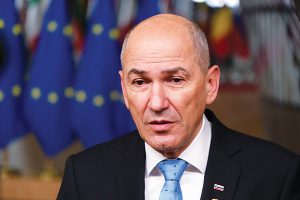Bloomberg
Slovenia’s premier faces pressure before April elections to block a deal that would hand a large chunk of the country’s biggest tourism group to a buyer with ties to the family of Hungarian Prime Minister Viktor Orban.
Political parties have called for an extraordinary parliamentary meeting for February 28 to demand the state exercise its right to buy the stake in question in Sava dd, which controls hotels spanning the Adriatic coast to the shore of picturesque Lake Bled in the Alps.
Prime Minister Janez Jansa, fighting to win re-election in the April 24 ballot, now faces the risk of alienating both voters and potential coalition partners over a potential deal between two private companies in a country long known for reluctance to sell state-owned companies.
“Such important tourist infrastructure should be sold transparently, not through the family ties of a neighboring ruler,†Robert Golob, whose Freedom Movement overtook Jansa’s Democratic Party in the most recent Mediana poll, said by phone.
The issue resonates in Slovenia, which has lagged its central European peers with a post-communist privatisation push. Vested interests, a distrust of foreign capital and a string of bad experiences — including the 2019 bankruptcy of former national carrier Adria Airways three years after its sale — have all contributed.
Jansa has pushed back, telling lawmakers last month that those who were responsible for past state assets sales are now “pointing the finger at this government.â€
But the transaction has also gained controversy because of who is involved. Under the proposal, Budapest-based Prestige Tourism would buy York Capital Management’s 43.2% stake for a reported 38 million euros ($43 million). Prestige Tourism declined to comment on the potential purchase price.
The chief executive and minority owner of the Hungarian company, which was set up last year, is a business partner of Orban’s son-in-law. Investors close to Orban have snapped up assets across the Balkans, ranging from a television network in Slovenia, to a soccer club in Croatia and mobile operators in Albania and Montenegro.
Protesters earlier this month projected the Hungarian flag onto the parliament building in Ljubljana to protest Hungary’s growing economic influence. Last year, OTP Bank Nyrt. became the biggest bank in Slovenia while oil refiner Mol Nyrt bought 120 filling stations.
Orban is meeting Jansa Monday in the Slovenian region bordering Hungary to discuss economic development projects.
“The potential sale of Sava is heavily politicised and can potentially hurt Jansa and coalition parties, as some voters are still very sentimental toward Slovenian ownership,†said Rok Caks, political analyst at the Domovina news outlet.
Even a member of Jansa’s ruling coalition, Economy Minister Zdravko Pocivalsek of the liberal Concretely party, has joined calls for Slovenia’s Sovereign Holding to exercise its purchase option and raise the state’s stake in Sava to about 90%.
Labour unions, meanwhile, fear the sale could trigger job cuts among the tourism conglomerate’s more than 1,000 employees.
“We’ve had a lot of bad experiences with foreign owners,†said Breda Crncec of the Hospitality and Tourism industry Union.
 The Gulf Time Newspaper One of the finest business newspapers in the UAE brought to you by our professional writers and editors.
The Gulf Time Newspaper One of the finest business newspapers in the UAE brought to you by our professional writers and editors.
